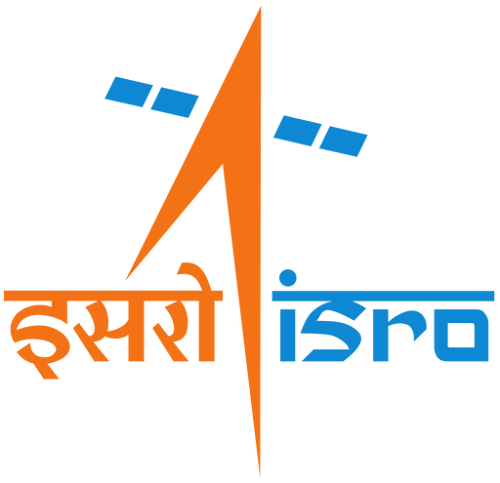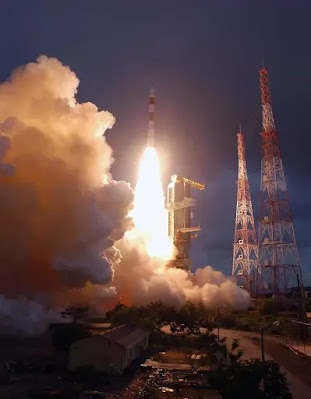Top Achievements of ISRO | Space missions of ISRO | Information about Indian Space Research Organisation
Indian Space Research Organisation (ISRO) was established on 15 August, 1969. Now, ISRO became
one of the top space agency and reached many milestones.
 |
| Image credit: ISRO |
1) Mangalyaan:
Mangalyaan is also called as The Mass Orbiter Mission (MOM).
 |
| Mars_Orbiter_Mission_Mangalyaan_Into_the_dark_space Image credit: De Nesnad - Trabajo propio, CC BY-SA 4.0, https://commons.wikimedia.org/w/index.php?curid=29435816 |
From last decades, ISRO is planning to send a spacecraft to
Mars. In 2012, ISRO started a project called 'Mangalyaan'. In 2014, Mars came
closer to the Earth, so ISRO wanted to use this opportunity and thought to
launch this spacecraft before 2014 to get into Mars orbit easily.
On 5 November, 2013 ISRO launched a space probe called
'Mangala' in PSLV rocket, which is the ISRO's first interplanetary mission. It
travelled 400 million kms for a total of 300 days and on 24 September 2014, it
successfully reached Mars orbit. By this mission India set an record, becoming
the first country to be successful in their first attempt to Mars.
Mangalyaan costed about 4.5 billion rupees (73 million USD), which is very
less amount when compared to interplanetary missions of other countries.
Mangala studied the geology, atmosphere and history of life
on Mars.
2) Chandrayaan 1:
Since 1959, there was a huge competition between the NASA
and ROSCOSMOS to send spacecrafts to Moon. Similarly, India also thought to
send spacecrafts to Moon. In 2008, the thought became true by launching India's
1st lunar program on 22 October, 2008 called ‘Chandrayaan 1’. This project is
developed by ISRO, with our own technology.
On 8 November 2008, Chandrayaan 1 successfully entered into
the Moon's orbit. On 14 November, Moon impact probe separated from the
Chandrayaan 1 and crashed as planned at Shackleton Crater on Moon's South Pole.
It studied about the minerals and surface craters on Moon.
Chandrayaan 1 orbited Moon for a total of 312 days and made
3,400 orbits around the Moon and on 29 August 2009, ISRO lost communications
with Chandrayaan 1.
‘Chandrayaan 1 has successfully completed its research on
Moon' said by ISRO.
Where India became the 6th country to do research on Moon
and 4th country to land a spacecraft on Moon's surface.
Did you know?
Chandrayaan 1 confirmed the water ice on the Moon, becoming
the 1st space agency to do so.
3) PSLV c37:
In start of 20th century, all countries faced many problems
to send their satellites into space. But on 17 February 2014, ISRO sent 104
satellites into the space by breaking the old record set by Russia. All 104
satellites are carried into the space by PSLV rocket from Satish Dhawan space
centre.
In which, 3 satellites belonged to India called as,
1.Carto-sat 2 series satellite
2.INS-1
3.INS-2
96 satellites belonged to USA and other 5 satellites
belonged to Netherlands, Israel, Switzerland, Kazakhstan and UAE.
In 16 minutes after launch, PSLV reached into Sun's
synchronous orbit located at an altitude of 506 kms from Earth's surface. In
span of 12 minute's, all 104 satellites successfully separated from the PSLV.
Carto-sat 2 is the Earth's observatory satellite. It
observes Earth's environment and also used for military purposes. Remaining two
are nano satellites called as INS-1 and INS-2. These two satellites will study
the radiation effects on spacecrafts. Other 96 satellites belonged to USA, in
which 88 satellites are belonged to Planet labs company.
By this mission, ISRO has beaten the older record of 37
satellites carried by Russian Dnapr rocket.
4) INSAT:
Indian National Satellite System simply called as INSAT was
started in the year 1983.
Nearly 30 satellites are launched under the INSAT program,
which are mainly used for telecommunication, broadcasting, meteorology, search
and rescue operations.
INSAT is the largest domestic communication satellite system
in the Indo-Pacific region and controls communication over this region. Communications
in the TV, mobiles and other are possible because of the INSAT and it helps to
capture the distress signal from the aeroplanes and ships.
5) IRNSS:
Indian Regional Navigation Satellite System simply called as
IRNSS or Indian own GPS are Navigation satellites.
Since last decades, India is planning to start its own GPS
system. In 2013, this project was started and in between 2013 to 2018, total of
7 navigation satellites were launched by ISRO. These satellites cover India and
1500 kms across India. IRNSS is used for navigations in mobile, aeroplane,
ships etc.,
IRNSS is used for 2 types of services:
- > Standard positing service
- > Restricted service
Standard positing service is used for mobiles, maps etc.,
and Restricted service is used for military purposes.
In future, ISRO is planning to launch more IRNSS satellites
to cover more region about 6000 kms across India. By this mission, India stands
in the 6 countries that has own GPS system.
When compared to other countries, the missions launched by
ISRO costs very low and tops the list with highest success rate about 90%.
ISRO is also planning to launch more missions in future, in
which the major missions are,
Aditya L1 mission
Chandrayaan 3
EXPOSat Planetary exploration
Gaganayaan in 2021/2022
Mangalyaan 2 in 2022/2023
Shukrayaan in 2023 to 2025
India's space station
We will discuss them in soon.
Thank you.

Very good information bro.
ReplyDeleteThank you bro.
DeleteGud information (I think brooo... what you think ��������)
ReplyDeleteHaha, Thank you. Share.
Delete🇮🇳🇮🇳🇮🇳
ReplyDeleteSupport and share, Thank you.
DeleteSuperb.....nice info😉
ReplyDeleteThank you.
DeleteOsm... Really very interesting
ReplyDeleteThank you, share.
DeleteSare
DeleteSuperb information....
ReplyDeleteThank you.
DeleteVery nice information
ReplyDeleteThank you.
Deletesuperb information bro
ReplyDeleteThank you.
DeleteSuperb info
ReplyDeleteGood very interesting
ReplyDeleteThank you.
Deleteawesome broo...really intresting information
ReplyDeleteThank you.
DeleteBharath matha ki ✊
ReplyDeleteJai, Thank you.
DeleteThank you bro, do follow and share.
ReplyDeleteDoole
ReplyDeleteHaha, Thank you.
DeleteGood information 👍
ReplyDeleteThank you.
DeleteThank you.
ReplyDelete